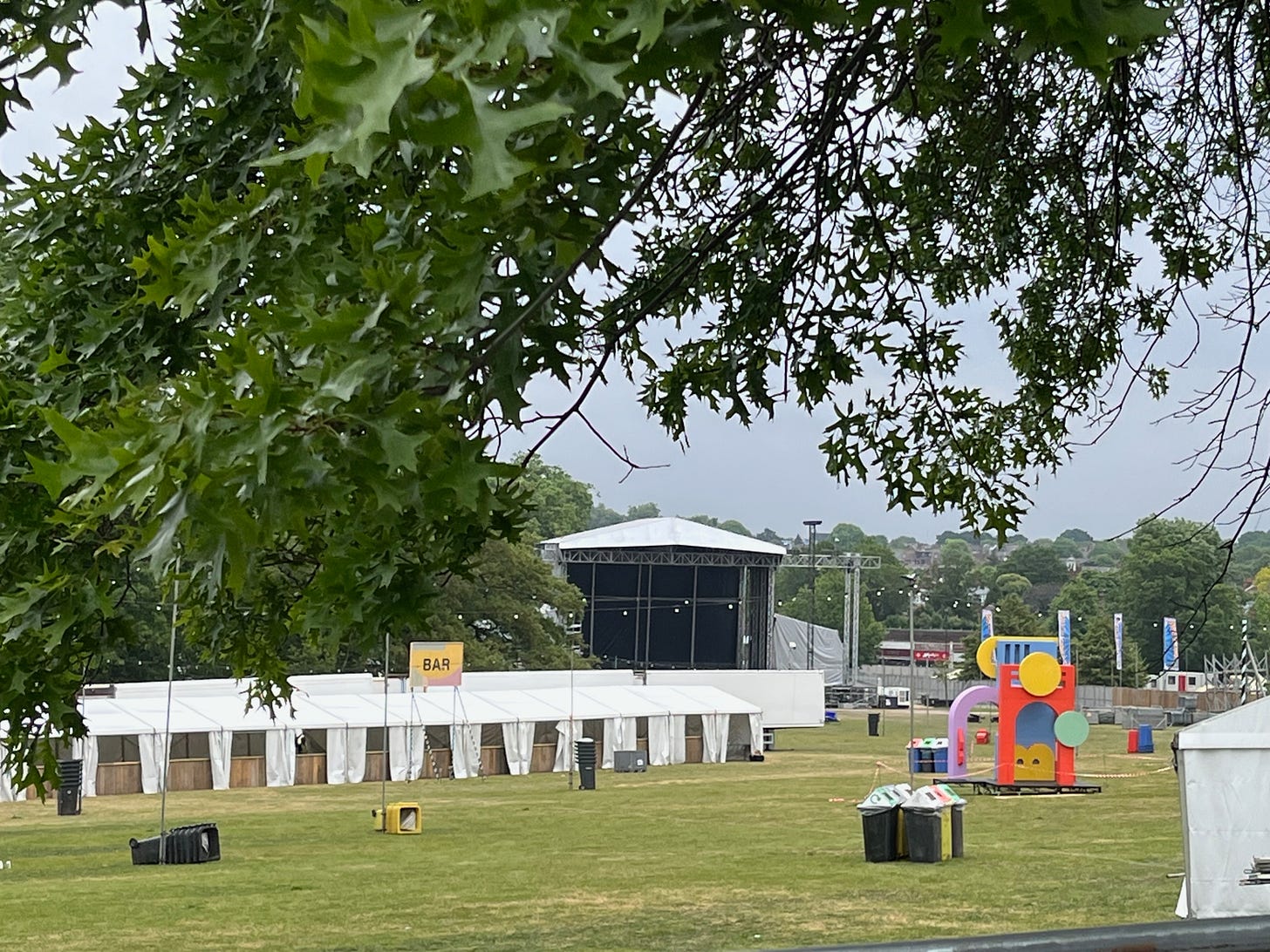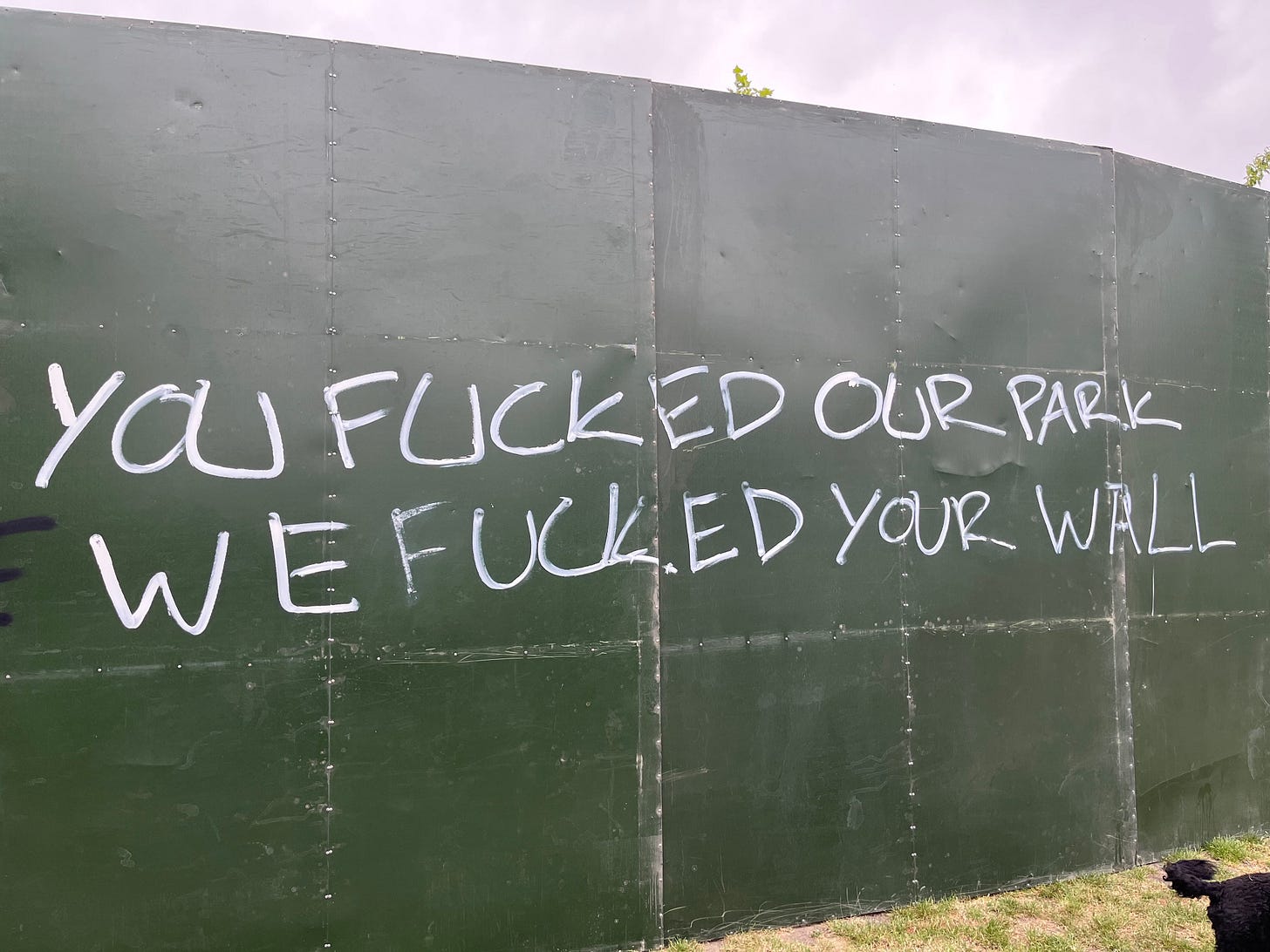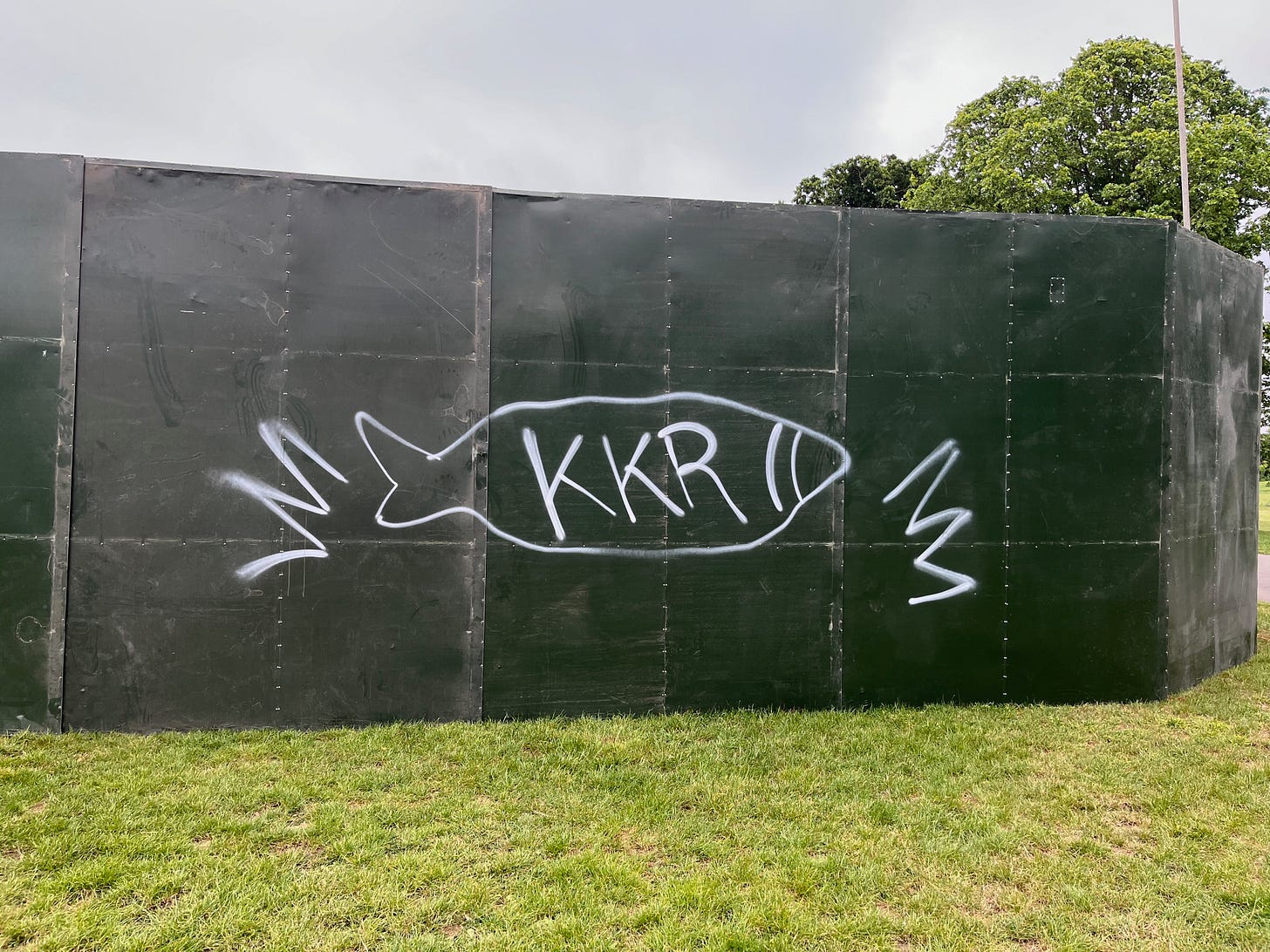Brockwell Park festivals back on for now — but new challenges in Finsbury Park and Victoria Park
Mighty Hoopla and Field Day insist they'll go ahead as planned this month, despite losing a legal battle. But London Centric has learned other festivals in parks could now face challenges.
Welcome to all the new London Centric readers who joined after watching the Private Eye interview about our nomination for the Paul Foot investigative journalism prize.
We’ve got some fresh investigations coming later this week. But first we’re bringing you a bonus edition, explaining the wider importance of Friday’s court ruling that this month’s festivals in Brockwell Park don’t have the correct planning permission.
This lunchtime the organisers of south London festivals such as Mighty Hoopla, Field Day, and Wide Awake said they will definitely take place from Friday onwards and “no event will be cancelled as a result of the high court’s decision”. The festival promoters said an emergency application for permitted development was submitted to Lambeth council this morning.
Not so quick, says Susan Ring, a partner at law firm Goodenough Ring, who represented the local residents in the case. She told London Centric there was no way Lambeth council should be able to legally approve the last-minute application: “We do not consider that they have any permitted development rights for the temporary period. We cannot see how their position is consistent with the judgment.”
At the same time, London Centric can reveal that the Brockwell Park case is starting to cause contagion in parks across the capital. The Friends of Finsbury Park in north London are “very excited about” the ruling and considering whether it sets a legal precedent that could help them curtail Wireless Festival and other major gigs in north London. Similar discussions are underway around Victoria Park in east London, where All Points East takes over the park for a large chunk of the summer.
Scroll down for what you need to know.
London Centric has been on this story from the start. One of our very first pieces back in October was about the free tickets festival promoters give to the capital’s politicians, and London Centric’s Rachel Rees was the only reporter who sat in the high court for every minute of last week’s legal hearing.
We won’t labour the point too much but doing journalism the proper way costs money — if you haven’t made the jump to being a paying subscriber, please consider doing so for 25% off.
Feedback is always appreciated via WhatsApp or email.
The Battle of Brockwell Park turns into a London-wide challenge to festivals.
What does Friday’s ruling mean for festivals in London?
The Brockwell Park festival promoters did not stop building their site when the judgment came in. When London Centric visited on Monday morning the site was almost complete, albeit covered in anti-festival graffiti with messages such as “picnics not pingers”.
Lambeth now says it is “urgently considering” a new proposal for a 24 day permit to cover the festivals, although it is not entirely clear how this will comply with the high court judge’s ruling, which appeared to require the site to be fully dismantled within this time frame. The council also defended the festivals as loved by “younger people” and said they are “strongly backed by our diverse communities”.
In some ways, the longer term importance of the Battle of Brockwell Park might be the precedent it set in clarifying the law for other festivals.
In the future any London park rented out for more than 28 non-consecutive days a year is much more likely to require full planning permission, leaving events more open to challenge by local residents’ groups. Finsbury Park and Victoria Park are among those where local campaigners believe the events may now be at risk.
Gina Harkell, co-chair of the Friends of Finsbury Park, told London Centric her group is “very excited” about the Brockwell Park ruling. It is already writing to Haringey council, in the belief that festivals featuring the likes of Fontaines D.C. and Stereophonics collectively take over the north London park for 47 days.
At Victoria Park in Tower Hamlets, home to AEG’s All Points East and LIDO festivals, local group Friends of Victoria Park described the number of current event days as “excessive”, with two separate events each taking up parts of the park for three to four weeks – again in excess of the allotted 28 days for permitted development. The group said that they are not currently planning legal action against Tower Hamlets council over the matter, citing a lack of resources, but opposition politicians are likely to increase scrutiny of the park’s usage.
How did we get here?
The woman at the heart of the story is Lucy Akrill, a local resident who lives near Brockwell Park. She did what seemingly no one in London had done before and actually read the planning law which governs temporary events.
This clearly states that a change of land use for up to 28 days per calendar year (which can be split into multiple chunks) doesn’t require full planning permission. Instead, events can essentially be waved through by the local council as “permitted development” with limited opportunity for the public to object.
The Brockwell Park festivals — and many other events across London — had always operated on the basis that they were easily done and dusted within this 28 day timeframe. Yet it seems there was a longstanding willingness by all parties to turn a blind eye to the time taken to construct and dismantle temporary structures such as stages and fences.
Akrill counted up the days and concluded that, when the build time is taken into account, a section of Brockwell Park would be out of action for 37 days this year. As a result, she felt the council had erred in not requiring full planning permission. She commissioned a legal opinion from a barrister who agreed with her, then crowdfunded £40,000 from her neighbours to take Lambeth council to a judicial review.
What happened when this went to court?
Akrill’s campaign group Protect Brockwell Park brought the case in the name of local resident Rebekah Shaman, the managing director of the British Hemp Alliance who describes herself as an “eco-consciousness pioneer”.
A high court judge concluded the group’s interpretation of the law was correct, giving them a high court victory that could set a precedent for temporary events across the country that take over any space, public or private, for an extended period of time.

Which company is making money from festivals in Brockwell Park?
Festivals are now big business and the days of small promoters being able to rent a London park and put on an event are in decline. One of the main industry trends has been consolidation, as small promoters that run one or two festivals are bought out by global festival operators.
One of the companies leading this consolidation is Superstruct, which was only founded in 2007 but now owns and operates more than 80 music festivals around the world, attracting 1.55m people in 2023.
Although it’s easy to portray this as a David and Goliath issue, in many cases Superstruct is paying vast sums to smaller promoters who have already managed to convince a local council to let them take over a park for a summer.
According to financial records seen by London Centric, Superstruct paid £4m to take control of Mighty Hoopla in 2023, with the former owners due to receive a further bonus of £1.2m in 2027 if Lambeth council continue to grant a licence to the event.
The previous owners of the festival were Gareth Cooper and Bradley Thompson of London promoter Broadwick Live, the same company which runs the giant Drumsheds club in north London.
Tell me more about Superstruct.
Superstruct is so powerful and successful that it’s been able to afford to hire Alex Mahon as its new boss. The outgoing chief executive of Channel 4 won’t come cheap and earned £1.5m last year. She already has an affinity with the capital’s open spaces: She is currently writing a novel called The Rich Bitch Club about high-flying female CEOs, which was inspired by her walks in Hyde Park with a colleague.
Despite having its headquarters in London, Superstruct’s global parent company is ultimately registered in Luxembourg. It is not known whether they were attracted by the tiny country’s long musical history, its low tax rate, or something else. This Luxembourg-based parent company was in turn bought last summer by the giant American private equity investment firms KKR and CVC, who will be looking to rapidly grow Superstruct over the coming years.
Ultimately the profits from the use of Brockwell Park for festivals are flowing up to Wall Street investors.
Why have people raised issues with KKR?
KKR is one of the world’s biggest investment firms, with stakes in thousands of companies around the world. In addition to owning Superstruct and its festivals in London parks, these investments include companies in Israel.
This led a group of musicians including Brian Eno and Massive Attack to criticise Field Day for its “complicity in Israel's genocide in Gaza and apartheid regime against all Palestinians”. As a result a growing number of performers have pulled out of Field Day in protest, making accusations of links to illegal settlements in the West Bank. The boundary fence around Brockwell Park, built without planning permission, now features graffiti of bombs with KKR’s initials inside.
In response, Mighty Hoopla and Field Day have issued public statements attacking their own corporate owners, who ultimately profit from their work.
The Mighty Hoopla team said they tried to abide by the Boycott, Divestment, Sanctions (BDS) guidelines against Israel but are unable to boycott their own parent company. They said the event became part of Superstruct in 2023 "to deliver a better quality event" and "secure the future of the festival" and they have no control over the “unethical investments” of their parent company. (The statement did not mention the £4m payout to Mighty Hoopla’s former owners as a reason for the change of ownership.)
Surely Lambeth is making lots of money from all the Brockwell Park festivals?
Not really, which has become one of the main sticking points. The council receives a few hundred thousand pounds towards the upkeep of the park and the promoters put on the Lambeth Country Fair for free, which the council estimates saves £700,000.
Susan Ring, the partner at Goodenough Ring, the law firm that represented the Brockwell Park residents, suggested planning matters for temporary events should be taken away from local councils in future, saying "there is too much conflict” with their status as the owners of local parks.
She summarised the judge’s ruling as: “You have 28 days [of permitted use per year] but the use has to revert after each section of days.”
Why did the local residents object to the festivals?
A combination of environmental and social reasons.
Don’t some people like festivals in parks?
London festivals sell millions of tickets to events in parks every summer, suggesting many people do. Local residents also get free or discounted tickets. The topic can be deeply polarising and cause suspicion. A group of friends calling themselves SayYesLambeth started to organise in support of Mighty Hoopla only to rapidly retreat amid accusations they were a fake pro-council lobbying group. When London Centric was taking photos of the Brockwell Park site on Monday morning, one reader of this newsletter approached us and said they wanted the events to go ahead.
Do the local campaigners want to stop all festivals?
This is a knotty issue. When London Centric interviewed Akrill she said her group had not established a settled view on this but suggested they were comfortable with events at a lower intensity, such as halving the number of festivals, or circulating festivals between different London parks.
In a statement issued on Sunday night the group said they are "not anti-festival" and will support "well-run, inclusive events" rather than "large-scale, high-impact commercial festivals". Yet at the same time, their lawyers have called on Lambeth to immediately cancel all the events that are due to take place and immediately dismantle the site.
Why don’t councils just put on free festivals in parks for residents?
Austerity, mainly. They have run out of money and spend the vast majority of their budgets on either temporary housing or adult social care. It’s hard to believe now but until the early 2010s councils across London used to put on free events in parks and pay for them out of council tax for the general gaiety of local residents. Council-funded free fireworks displays used to be common across the capital but one of the last events standing, in Tower Hamlets’ Victoria Park, hasn’t taken place since 2019.
To complicate matters, the Met police increasingly prefer events to be held in secure fenced-off areas with security rather than free-for-all unticketed events where anyone can wander in. Plus there’s the risk with social media of a free event becoming overwhelmed as people across the capital can see it go viral and want to join in.
Will the mayor step in?
Sadiq Khan has recently embraced the YIMBY (Yes In My Back Yard) movement that is in fashion with many younger Labour politicians. He’s become pro building on the Green Belt, is taking licensing powers away from local councils to ensure pubs are open later, and is talking about the nighttime economy as engine for economic growth. Yet his team have yet to respond to a request from London Centric on where they stand on Friday’s court verdict.
The politics are problematic for Khan. The Green Party has already won a council seat in Herne Hill from Labour with a campaign that focussed heavily on opposition to festivals in parks, with the party viewing the topic as a major vote winner during next year’s local elections.
Could this ruling see a return to more unusual venues and quirky festivals in London?
We’re not sure. If we’re honest, we only included this question in so we could gratuitously link to two of our favourite descriptions of vintage London music festivals: The time The Who played on the cricket field at the Oval and the time Lemmy from Motörhead posed with Dame Vera Lynn at an anti-heroin festival in Crystal Palace Park.
Please forward this edition of London Centric to a friend, get in touch via email or WhatsApp, or leave a comment.





I lived right next to those festival for 4+ years and those weekends were the best of the year. Loads of people coming into Lambeth, dressing up, having fun. Even without going to the festivals, it felt like you were included and the rest of the area benefited from the vibe.
They can claim whatever they want in public, in court their lawyers want it all shut down. Saying things like the festivals ruin trees with “bat roosting potential” is a joke. Living in zone 2, in an area where the closest tube is Brixton and expecting a quiet life is like moving to Tunbridge Wells expecting a good rave scene. They can't just enjoy the controlled chaos for a month in the summer and let other people into their rarefied air.
On the nature side of things, I would be really up for them getting the festivals to pay more into a restoration fund, or move it to another area of the park for different years to give the fields a break, or invest in less impactful staging, but that's another conversation and one these people don't actually want to have - they just want to say no.
It is probably worth noting the community response in Lambeth over the weekend to the potential cancellation of the festivals was overwhelming negative, bordering on febrile. The comments sections of the campaigners were bombarded with many hundreds of angry posts to the point where they had to disable them. Many people viewed the campaign, rightly or wrongly, as white middle class people gatekeeping public spaces solely for events that met their approval, without giving either space or thought to those other cultures who live alongside them and who hold different views on the importance of celebration. Other campaign groups should take note of the optics of nixing events that many community members actively look forward to. It really and truly could have turned quite nasty in Lambeth had the festivals been canned.